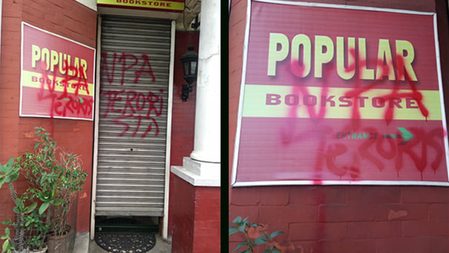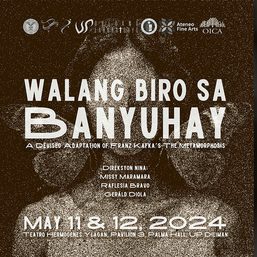SUMMARY
This is AI generated summarization, which may have errors. For context, always refer to the full article.
![[OPINION] On the red-tagging of bookshops](https://www.rappler.com/tachyon/2022/03/red-tagging-bookshops-march-23-2022.jpg)
Yesterday, Popular Bookstore and Solidaridad Bookshop – two of Manila’s oldest independent bookshops – were vandalized with graffiti. Based on the photos, this was a coordinated assault of “red-tagging” the bookshops as it occurred on the same day, the use of red spray paint and defacing the terms “NPA” and “Terorista.”
On a personal note, I was furious when I learned about what happened to Popular and Solidaridad. These two bookshops provided much of my Filipiniana collection and were influential in the development of my career as a budding young historian.
I first heard about Popular and Solidaridad during my university days at Santo Tomas from my professor, who started his academic career as a book reviewer at the defunct The Republic and The Weekly Graphic. He told me about three famous bookshops that writers, academics, and intellectuals in Manila frequented then: Popular in Sta. Cruz, Solidaridad in Padre Faura, and Erehwon in Ermita.
As a curious student then, I visited Popular Bookstore in Tomas Morato the next day by the end of a morning class. During my first visit at Popular, I remember being astonished by the range of Filipiniana titles on its shelves. A mix of first and reprint editions of paperbacks and hardcovers written by Filipino writers, historians, political economists, sociologists, and even famed radical intellectuals from the 1960s. Popular carried titles that you will not see in mainstream bookshops like the liberation theology book of Pedro Salgado O.P., Social Problem and Revolution; nationalist economist Alejandro Lichauco’s primer on American neocolonialism in the country, Hunger, Corruption, and Betrayal; and Jim Richardson and Jonathan Fast’s analysis of 19th-century Philippine political economy, Roots of Dependency.
That day, I went home with historian Renato Constantino’s The Making of a Filipino, printed in 1969. The book was an intellectual biography of nationalist senator Claro M. Recto tracing “the origin and development of Philippine colonial politics.” Surprisingly, a few years later, the first book I bought at Popular became instrumental when I was looking for a topic for my master’s thesis. Since my first visit, I have regularly visited the bookshop, completing the rare Constantino monographs and buying out-of-print Ateneo and UP press titles.
On the other hand, Solidaridad, founded and owned by the late National Artist F. Sionil Jose, was my go-to bookshop whenever a new Filipiniana book came out – locally printed or from abroad. Compared to Popular, Solidaridad has a more diverse collection. Of course, half of the store was Filipiniana. The other half is divided into area studies (emphasis on regions East and Southeast Asia), world history, literature, philosophy, and religion. My first acquisitions were Gregg Jones’ Honor In The Dust and Frank Golay’s Face of Empire. The former is about the Philippine-American War, while the latter is about the maturity of America’s foreign policy towards the country. Reading the books, I did not only gain new historical knowledge about America’s imperial dream and drama in the Philippines, but I was exposed to the kind of scholarship outside the country. My next visits were followed by some Philippine Studies classics: Teodoro Agoncillo’s Revolt of the Masses, Reynaldo Ileto’s Pasyon and Revolution, and Vicente Rafael’s The Promise of the Foreign – three books that every student of history should read.
Yes, it is a luxury to buy and collect books. Coming from a lower-middle-class family, I was fortunate that my parents supported such a newfound interest in reading books. This worked for my parents and me as I was not fond of video games.
Also, the same professor who told me about the bookshops told our class during our first meeting with him that history is a reading course. Thus, reading books and frequenting bookshops became my hobbies. Reading is an investment not even worth a billion pesos. From Filipiniana, I gained knowledge about our history and culture, but I also came to understand more about what it meant to be critical and Filipino – someone who is always discerning and full of empathy.
These vandalizing assaults were also an attack on our yearning for knowledge. After seeing the photos, my first thoughts were: do we want a society where everyone’s afraid to step inside bookshops because they might get red-tagged? If these can happen to independent bookshops, will libraries be vandalized and red-tagged, too? Just imagine the many young Filipinos who are yet to discover Popular and Solidaridad and their vast collections. Remember that the young José Rizal, in his A la juventud filipina, told us to nurture and protect tomorrow’s youth – this includes the youth’s self-discovery about our rich history and culture through books, and I speak from experience.
What happened at Popular and Solidaridad was the handiwork of brutes, who are the real terrorists. The goal of the perpetrators was to provoke fear among its owners and patrons, but Popular and Solidaridad are still standing today because of their owners’ persistence and their patrons’ hunger for knowledge! – Rappler.com
Luis Zuriel P. Domingo teaches history. At present, he is writing a thesis project about the history of post-independence nationalism in the Philippines from 1946-1972.
Add a comment
How does this make you feel?

![[OPINION] Defend freedom of thought! Hands off our libraries!](https://www.rappler.com/tachyon/2021/09/ispeak-libraries-1280.jpg?fit=449%2C449)
![[Rappler’s Best] Welcome to the battlefield](https://www.rappler.com/tachyon/2024/05/maria-ressa-harvard-scaled.jpeg?resize=257%2C257&crop=133px%2C0px%2C1920px%2C1920px)


![[OPINION] Social media and limits of protected speech](https://www.rappler.com/tachyon/2024/04/TL-badoy-red-tagging-2-apr-27-2024.jpg?resize=257%2C257&crop=327px%2C0px%2C720px%2C720px)
![[OPINION] Badoy’s red-tagging and freedom of expression](https://www.rappler.com/tachyon/2024/04/20240426-Badoy-red-tagging-freedom-expression.jpg?resize=257%2C257&crop_strategy=attention)
![[OPINION] How can teachers develop a reading habit among learners?](https://www.rappler.com/tachyon/2024/07/imho-reading-habit.jpg?resize=257%2C257&crop_strategy=attention)




There are no comments yet. Add your comment to start the conversation.